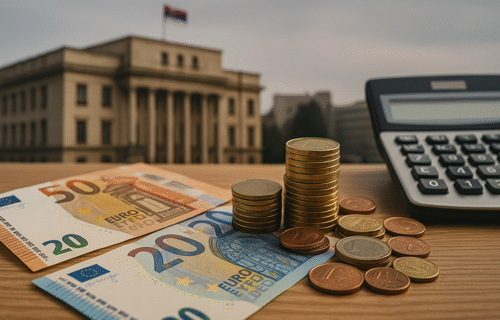Slovakia’s Ministry of Finance has presented a new consolidation package aimed at reducing the country’s budget deficit. The measures, worth around €2.7 billion, are designed to improve the sustainability of public finances but have drawn strong criticism from the opposition and analysts.
Finance Minister Ladislav Kamenický said the package includes 22 measures, almost half of which focus on reducing state spending. Planned steps include limiting wage costs across ministries, with redundancies not ruled out, while still allowing for targeted pay rises for teachers, doctors, and nurses. Municipalities will be expected to save about €130 million.
On the revenue side, the government proposes higher taxes on high earners and politicians, an increase in compulsory health insurance contributions from employees and sole traders, and higher taxation of gambling operators. The state expects €358 million from health insurance changes and €206 million from higher income taxes on top earners. The package also introduces a higher 23 percent VAT rate for some foodstuffs containing salt and sugar, up from the current 19 percent.
Other measures include new fees on the extraction of gravel, sand, and stone; restrictions on VAT deductions for vehicles used partly for private purposes; and adjustments to unemployment benefits, which would be reduced after four months of registration. The lowest social security contributions would rise by 20 percent. Employers would also be required to cover a longer share of sick pay.
Kamenický, deputy chairman of the ruling Smer-SD party, argued the government must consolidate finances after deficits left by previous administrations. Slovakia’s public deficit reached 5.27 percent of GDP in 2024, above the EU’s 3 percent ceiling, and the country is currently under an EU excessive deficit procedure.
Opposition leaders condemned the plan. Progressive Slovakia’s Michal Šimečka called it a “frontal attack on working people,” warning of lower consumption and recession risks. Igor Matovič of the Movement Slovakia said the government was burdening households, while Marián Viskupič of Freedom and Solidarity described it as further impoverishment.
Analysts also voiced concern. Slovenská sporiteľňa’s Matej Horňák wrote that lower net incomes and fewer holidays would reduce consumption and investment, likely slowing GDP growth below the bank’s 2026 projection of 1.3 percent. The Independent Budget Council noted that many of the measures are temporary or one-off, and therefore insufficient for long-term fiscal stability.
The government has already introduced two earlier consolidation packages worth a combined €4.7 billion since taking office last year. Like the latest plan, they relied heavily on tax increases and compulsory levies.
The cabinet is expected to discuss the new package this week.
